

Project «Voices of Jewish settlements. Vitebsk region.»פיתוח קשרי התרבות בין העמים של ישראל ובלרוס
|
|---|
Website search |
|
MainNew publicationsContactsSite mapVitebsk regionMogilev regionMinsk regionMikhail Rivkin, Arkady Shulman
|
Memories of Inessa Gdalievna Ivanova (Aronson):Inessa Gdalievna is a teacher with many years of experience, her story was interesting and knowledgeable. However, when she started talking about the war years, I could not only feel she was troubled by the memories – she narrated as if the events had taken place several days before.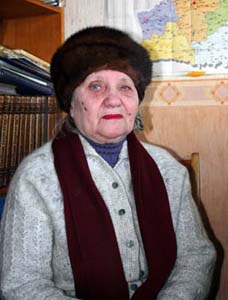 Inessa Gdalievna Ivanova.
Inessa Gdalievna Ivanova.April, 2009. - I was born in Vitebsk at Mogilevskaya Square, 3, on the bank of the Dvina. Our house was spacious and very cozy. Both of my parents worked as accountants. My grandmother died in 1939 and grandfather stayed to live with mother. He adored her. My father’s name was Gdaly Abramovich Aronson, mother’s – Sima Samuilovna Roninson. When the war broke out I was 6 and it seems to me I can still remember everything. It was scary, really scary. Vitebsk was not bombed yet. My father was called to the military registration office to help register conscripts. He came home at night; brought several books for me and kissed me. Then mother told me that a car would come to pick us up, but for some reason it did not. So, we stayed in the city and hid in a shelter not far from our house. Once, we came back home to find a ditch instead of it – it had been hit by a bomb. I saw people in grey uniform - I clearly remember that, and I heard them speak an unfamiliar language. Then someone let us sleep in their barn. Three weeks before the war my aunt, Mariasa Shmuilovna from Moscow, came to her parents’ house in Vitebsk to give birth. When the war started the baby was three weeks old. I can still see my mom sitting at the entrance to the barn and cutting my aunt’s yellow jacket. She cut out circles and attached them to our clothes. All the Jews were ordered to wear clothes with such marks. Then we saw people with white stripes on their sleeves – Nazi policemen. They took us to Komsomolskaya Street, 30 and 32. These houses had basements. They are still there. Our family was in the basement of house # 30. It was so cramped that it was impossible to stand up or sit down. People were sleeping sitting down. My aunt’s baby was crying and shouting and from time to time they let her go out so that she could calm it down. It did not even have a name yet. Once, an officer came and saw my aunt standing on the pavement. It happened so that now every day I have to pass this place to do my shopping. And it brings back the memories. I now live right opposite the building where we used to live. The German officer was probably drunk… He grabbed the baby on the legs and shook it so abruptly that he tore it. The baby shouted a little more and died. It was buried in the corner of that yard. Aunt Mariasa and grandfather somehow managed to leave the basement. Then grandfather most probably was killed somewhere. His name was Shmuila Roninson. Aunt Marisa was a doctor and after escaping from Vitebsk she crossed the front line and worked in a mobile hospital until the end of the war. We stayed in Vitebsk – mother was not able to leave since she had nephritis. She was only 28 and father was 12 years older than her. 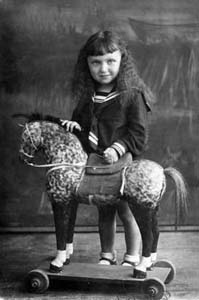 Inessa Aronson.
Inessa Aronson.Photo taken in 1940. Sometimes we were allowed to leave the basement. I was a child and needed some activity. Appearance-wise I was a typically Russian child with blue eyes and fair complexion. Once, I noticed something round and shiny in the center of the yard and ran towards it. Suddenly I got stuck to it and was not even able to move my feet. It was either tar or bitumen. I shouted: “Mom, mom!” However a German officer came to me faster than my mom did. I can still remember what he looked like: plump, with red cheeks and a smile on his face. Germans did not visit our yard very frequently. It was more often visited by policemen who shouted: “Jews. Shut up!” So this German officer pulled me out of the black mash. Certainly, he understood who I was. My mom was already next to me, too. He started talking to her – she understood German because she could speak Yiddish. The man smiled and asked: “What is the girl’s name?” She said: “Inna”. “Oh”, - he exclaimed, - “My wife’s name’s Inna, Inessa”. Then he took out a photo and showed it to us. In the photo there was a pretty woman, a man and two children – the whole family. Some Germans were different, too. Eventually we were pushed out of the basements and taken to the Blokhin Bridge. We were convoyed there by policemen; in fact, very few Germans were near the bridge. I said I needed to pee. There was a house near us. Mother suddenly pulled me by the hand and pushed into that building and then quickly got in herself. Nobody noticed us, or at least nobody pretended they did. There were metal plates that had fallen from the roof. Mother spread them on the floor, lay there, put me on top of her and covered us with another tin plate. 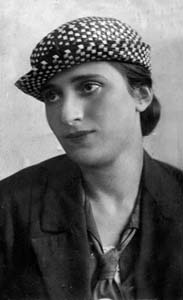 Sima Samuilovna Aronson.
Sima Samuilovna Aronson.Pre-war photograph. At that moment a German came in. As they say, there is one step from tragedy to comedy. He came to use the building as a toilet and turned his back to us. Mother feared I would move but I did my best to remain motionless. The man left after doing his business. We waited till it got dark and got out of the building. We went to my mom’s friend, Yekaterina Timofeyevna, who was a tailor. She had her own house. These days there is a polyclinic there, in Shrader Street. She had a husband, a Ukrainian, and daughter Galia, who was 17 – a very pretty girl with dark hair. The girl was hanging out with Germans. I remember two young German soldiers came to pick her up and they went for a walk. She knew we were Jewish. We stayed there for two days and then went to my mother’s former classmate, Vera. Her father was a policeman. When we came to her mother said: “Can you give us food and let us sleep at your place?” She said: “Of course, Simochka. I will do everything.” She fed us. Mother was very weak and went to bed at once. I went playing with Vera’s son. Suddenly I heard shouting: “Innochka! Innochka!” I ran out and saw drunken Germans whipping my mom and roaring with laughter. I ran up to her and was hit on the head. The Germans were deriving enormous pleasure from that. It turned out that Vera brought the Germans and said: “Take this beggar away.” Later I said to my mom that we should be grateful to her because she had not told the Germans we were Jewish. We left the city. It was still warm and we were hiding in the afternoon and walking at night. Sometimes people in villages agreed to give us temporary shelter or food. Mother got hydrogen peroxide and dyed her hair light. I could not pronounce the Russian “r’ and mother was very worried about that - it could show my Jewish origin. So, she taught me tongue twisters. Once, we were spending a night at a house and Germans showed up. We hid on the stove. I heard them shouting but in the end they left. I got so scared and I finally managed to pronounce the sound on that day. Then another night a woman let us stay in her house and fed us. At night her husband came with policemen – they were drinking. When all the guests left he ordered us to leave, at night. I can thank him that he at least did not give us out. We were not so much afraid of Germans as we were of Nazi policemen – they could be much more violent. 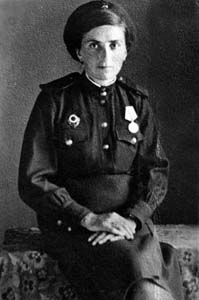 Mariasa Shmuilovna.
Mariasa Shmuilovna.Photo taken in 1945. I remember another night. We were walking and as I spotted some lights I said: “Mom, look, there are houses.” She replied: “Be quiet. These are wolves.” At that time wolves were not starving – there were plenty of corpses. Once, we were sheltered by an Orthodox priest and we spent a night in a church. Did he know who we were? Mother found a certificate, given to Sokolova Serafima Nikolayevna. The woman must have lost it. The name in the certificate was the same as mother’s name. I think that was a gift of fate. Eventually we reached a village called Bolshoye Ozeretskoye, which is on the way from Vitebsk to Senno. One woman, whose name was Platoniha, sheltered us. Her neighbor, named Bronchiha, who had two children, also treated us really well. Soon mother established contact with Leonov’s partisan brigade and became its messenger. She was suspected of having fake documents and policemen made her go to Senno to get documents from Germans. She was also warned that if she failed to submit the documents by the evening, the kid, or I, would be shot. I was a hostage. Mother went there. I can’t say she was badly tortured but they did squeeze her arm in the door trying to get the truth about who she really was. An interpreter helped her – he told the Germans things that saved her when mother did not answer their questions correctly. She understood what he was translating. She was interrogated by a German officer and was finally given the necessary documents. I remember I had to stand on a porch in my red overcoat. I was watched by policemen. Senno was 9 kilometers away; the sun was setting. Then I saw my mom running and waving a white sheet of paper – the certificate she had received. She was so frightened they would do something to me and ran so fast that her throat started bleeding. 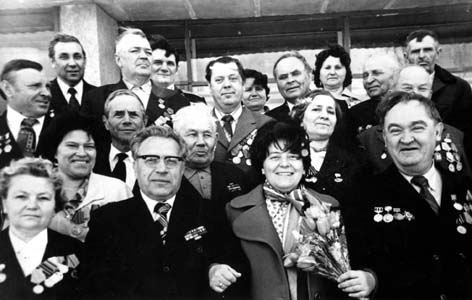
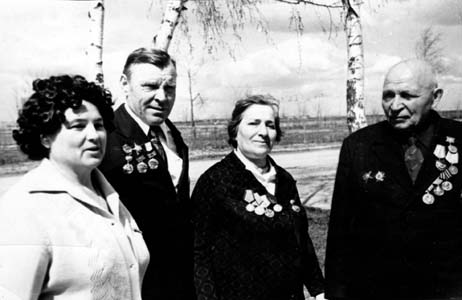 Sima Samuilovna Aronson with partisans from Leonov’s brigade.
Sima Samuilovna Aronson with partisans from Leonov’s brigade.
Mother grazed cattle and every now and then partisans would take a calf from her herd. Soon people started suspecting her of contacts with partisans. The people in her brigade found out that there was a plan to shoot us one night and we were urgently taken to the forest and so we joined the brigade. Apart from being a messenger, mother also took care of the wounded. I was also busy helping her wash the bandage, feeding the wounded and taking food to the post. We were in the brigade from August, 1941 to December, 1942. There were two more families in the brigade – the Maksimovich and the Dubrovsky family. Germans had arranged to shoot them because their fathers had gone to the forest to fight but the partisans saved them. I also remember David Sholomson, who was 12 years older than me – he had escaped from the Polotsk ghetto. When Germans started to siege partisan brigades there was a decision to move us. Our trip lasted for almost three weeks. We were travelling with a lot of other people, accompanied by a guide. At the beginning of 1943 we were in Toropets, which was a liberated front town. The chairman of the town council gave me a piece of brown bread and a candy on top of it. I do not remember the taste of the candy, but I can still clearly remember the taste of the bread. Then we found ourselves in the Urals. In 1944 father found us and sent us his officer’s certificate. Once a month we went to the market to buy bread, a can of milk and especially for me mother bought candy. This I will not forget, either. When father was demobilized in 1946, he came to live with us in the Urals. He was highly respected there – the first officer to come back from the war. He had fought near Stalingrad and had been wounded. He was offered a position of an accountant in a goldfield but he decided to come back to his place of birth. So, we came back to Vitebsk. I finished school here and went to work in a factory. Then I got married and soon gave birth to a boy. I always wanted to become a teacher so I entered the Institute of Pedagogy and then worked at a school for 32 years. Now I am retired. Inessa Ivanova’s interview |
|||
|
|
Jewish settlements in Vitebsk regionVitebsk • Albrehtovo • Babinovichi • Baran • Bayevo • Begoml • Beshenkovichi • Bocheikovo • Bogushevsk • Borkovichi • Braslav • Bychiha • Chashniki • Disna • Dobromysli • Dokshitsy • Druya • Dubrovno • Glubokoye • Gorodok • Kamen • Kohanovo • Kolyshki • Kopys • Krasnopolie • Kublichi • Lepel • Liady • Liozno • Lukoml • Luzhki • Lyntupy • Miory • Obol • Oboltsy • Orsha • Osintorf • Ostrovno • Parafianovo • Plissa • Polotsk • Prozorki • Senno • Sharkovshina • Shumilino • Sirotino • Slaveni• Smolyany • Surazh • Tolochin • Ulla • Verhnedvinsk • Vidzy • Volyntsy • Yanovichi • Yezerishe • Zhary • Ziabki • |
Main |
New publications |
Contacts |
Site map |
Vitebsk region |
Mogilev region |
Minsk region |